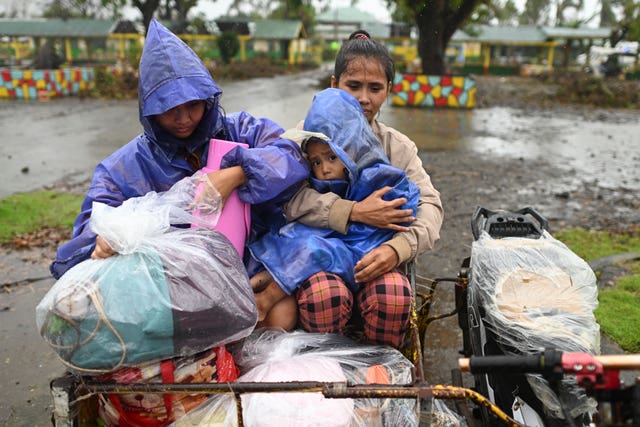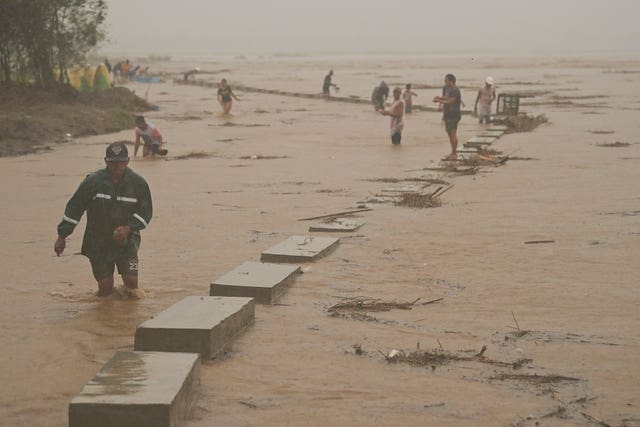
The fifth major storm in three weeks has slammed into the north-eastern Philippines, prompting more evacuations and a United Nations call for emergency funds to help the government address the plight of rural villagers.
Typhoon Usagi had sustained winds of up to 109mph and gusts of up to 149mph when it roared into the coastal town of Baggao in Cagayan province at the northern tip of Luzon, the country’s most populous agricultural region.
Locally named Ofel, the typhoon was barrelling north west and was forecast to blow away overnight towards southern Taiwan.
Another storm was brewing in the Pacific and may hit the northern Philippines this weekend, according to forecasters.

The country’s weather agency warned of life-threatening tidal surges of more than 3m (nearly 10ft) in coastal areas of Cagayan and seven other nearby provinces and clusters of islands, and urged all ships to remain in port or immediately take shelter.
Typhoon Toraji blew away from the northern Philippines just two days ago after unleashing floods, knocking down power lines and forcing more than 82,500 people to evacuate their homes.
The government has struggled to deal with the impact of the last four major storms, which left at least 160 people dead, displaced millions and devastated farmland and infrastructure, mostly in the northern Luzon region.
President Ferdinand Marcos Jr’s administration has spent more than 1 billion pesos (£13.4 million) on food and other aid for hundreds of thousands of storm victims, welfare assistant secretary Irene Dumlao said.
Defence secretary Gilberto Teodoro, who oversees disaster response efforts, sought the help of neighbouring countries, including Singapore, Indonesia, Malaysia and Brunei, in providing additional aircraft to transport food, water and other aid to villages isolated by the storms.
The United States, Manila’s long-time treaty ally, deployed cargo aircraft with food and other assistance.

The UN Humanitarian Country Team in the Philippines said it was raising 32.9 million dollars (£26m) to help the government provide assistance to about 210,000 people in critical need of aid and protection, especially women, children and people with disabilities, in the next three months.
“The Philippines is facing an exceptionally challenging tropical cyclone season, with successive cyclones reaching unprecedented locations and scales,” the UN team said in its emergency plan. “Local authorities, who are often impacted themselves, are overwhelmed as they simultaneously respond to the crisis and coordinate rescue efforts for affected families.”
The Philippines is battered by about 20 typhoons and tropical storms each year. It is often hit by earthquakes and has more than a dozen active volcanoes, making it one of the world’s most disaster-prone countries.
In 2013, Typhoon Haiyan, one of the strongest recorded tropical cyclones, left more than 7,300 people dead or missing, flattened entire villages and caused ships to run aground and smash into houses in the central Philippines.


Why are you making commenting on The Herald only available to subscribers?
It should have been a safe space for informed debate, somewhere for readers to discuss issues around the biggest stories of the day, but all too often the below the line comments on most websites have become bogged down by off-topic discussions and abuse.
heraldscotland.com is tackling this problem by allowing only subscribers to comment.
We are doing this to improve the experience for our loyal readers and we believe it will reduce the ability of trolls and troublemakers, who occasionally find their way onto our site, to abuse our journalists and readers. We also hope it will help the comments section fulfil its promise as a part of Scotland's conversation with itself.
We are lucky at The Herald. We are read by an informed, educated readership who can add their knowledge and insights to our stories.
That is invaluable.
We are making the subscriber-only change to support our valued readers, who tell us they don't want the site cluttered up with irrelevant comments, untruths and abuse.
In the past, the journalist’s job was to collect and distribute information to the audience. Technology means that readers can shape a discussion. We look forward to hearing from you on heraldscotland.com
Comments & Moderation
Readers’ comments: You are personally liable for the content of any comments you upload to this website, so please act responsibly. We do not pre-moderate or monitor readers’ comments appearing on our websites, but we do post-moderate in response to complaints we receive or otherwise when a potential problem comes to our attention. You can make a complaint by using the ‘report this post’ link . We may then apply our discretion under the user terms to amend or delete comments.
Post moderation is undertaken full-time 9am-6pm on weekdays, and on a part-time basis outwith those hours.
Read the rules hereLast Updated:
Report this comment Cancel